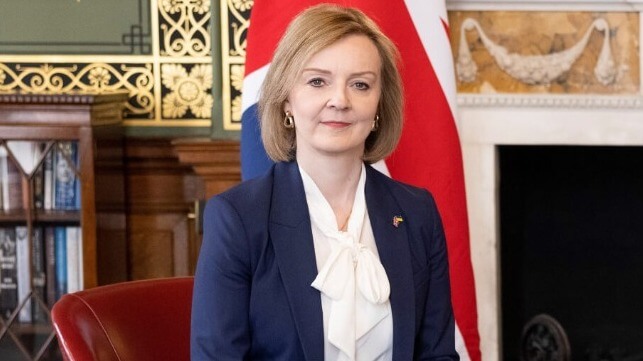UK’s New PM Pledged Expanded Freeports and Curbing Labor Actions

Liz Truss who became the UK’s new Prime Minister on Tuesday made promises during the hard-fought campaign that would have a significant impact on ports and the shipping community. Truss takes over a country facing industrial unrest and a sweeping energy crisis affecting households’ power bills. Most importantly, Truss’s win has rekindled a conversation about some of the promises she made to the UK shipping community during the campaign.
Top on the agenda is the pledge to introduce what she called “full-fat freeports” in a bid to boost the growth of the UK economy. The Truss campaign said the freeports would see brownfield sites and other locations turned into investment zones. It was part of her new promises of reducing regulation and cutting Whitehall bureaucracy.
“As a prime minister, I will be focused on turbo-charging business investment and delivering the economic growth our country desperately needs. We can’t carry on allowing Whitehall to pick the winners and losers, like we have seen with the current Freeport model,” said Truss back in July.
The outgoing Prime Minister Boris Johnson had also come out strong on freeports, which became one of the flagship post-Brexit policies under his government with several freeport locations announced last year.
In revamping the policy, Truss indicated that the investment zones would benefit from a low tax burden, reduced planning restrictions, and regulations tailored on an individual basis. Truss also tied the Freeport plan into the government’s leveling-up pledge, which aims to promote growth in Coastal towns.
Supposing Truss fulfills her pledge on the freeports, some observers in the maritime industry believes it is a welcome idea for the UK as a whole and consumers.
“The introduction of freeports would mean a lot of goods can be shipped via, and handled within, the UK tariff-free. This would likely mean an increase in post-production goods and goods that normally have large tariffs applied to them (example, tobacco and alcohol) coming via the UK to take advantage of lower tariffs. It could absolutely see an increase in imports as duty and paperwork are reduced compared with calling at ports in other areas,” said Henry Waterfield, Founder and CEO of the London-based Spot Ship Company, a firm specializing in maritime digital technology.

that matters most
Get the latest maritime news delivered to your inbox daily.
In addition, Truss had also pledged sweeping reforms to UK trade union laws, which would guarantee minimum services during strikes and raise the minimum threshold on the number of workers needing to take part in ballots on industrial action.
One of the first tests of Truss’s stance on unions could come at the major seaports. Last month, almost 2,000 workers went on strike at the Port of Felixstowe, one of the UK’s largest container terminals. While the dispute at Felixstowe remains unsettled with the union threatening further job actions, another industrial action has been announced from September 19 to October 3 at the Port of Liverpool. Unite the union says over 560 port workers will walk off the job in Liverpool in a dispute over wages and work rules.
